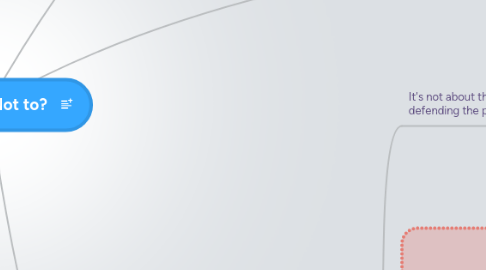
1. Liability
1.1. If the patent is sued / attacked
1.1.1. The patent is granted to the suer. Money used to maintain the patent is put down the drain because you are not able to defend it in the end game. Cash Loss. (Establish that Cash is King) also attack : Marketability is questionable.
1.2. The startup does not have any capability to defend the patent
2. Cost of Maintaining a Patent
2.1. You do not want to spend money on 'items' that does not move the company forward.
2.2. In a startup cash is 'king'
3. Protecting yourself from Pirates / Copycats
3.1. Pirates can be large corporations
3.2. Pirates can be small startups who need the technology as well
3.3. Pirates can be Patent Trolls who take patents so that they can resell at a higher price.
3.3.1. In this case, patenting your technology puts you in a more vulnerable position to theft.
4. Versus : Profit or Marketability
5. And peptides are involved in what kind of drugs? e.g. Therapeutic , Narcoleptics, Antibiotics? It would help to research (and you will show this in class that) Antibiotics might be at a weaker marketability position than Vitamin Supplements
5.1. cause the vitamin and supplements industry is very much booming right now
5.2. "The market is expected to grow at a CAGR of 9-10% to reach approximately USD 27.3 billion by 2018."
5.2.1. BUT compared to the others?
5.2.2. The peptide market is small talaga and the company in question is a very minor player, but it's a noticeably growing business.
5.2.2.1. This is a point in attack because, the market segment is very small. The next step is to find out what statements will gravitate the implications of having a small market segment
5.2.2.1.1. bugbugin mo sila rito. But I ask you, why do you say that market segment is important ?
5.3. Also, peptides are involved in different kinds of drugs eh, but mostly biotherapeutics. Not like supplements but more effective than normal drugs because peptides are more targeted and thus, more effective.
6. Is it worth it to defend the patent?
6.1. It's not about the absolute value of defending the patent.
6.1.1. If the patent cost 1,000 php /month but yields only 500 php / month. It is not worth it to Defend the patent (even though it looks cheap : it's still money down the drain)
6.1.1.1. Even if it is cheap to the company. Even if funding is available, A good Financial Officer will be questioned of making a decision like this.
6.1.2. If the patent costs 1M pesos /month but yields 5 M pesos . month. It is still worth it to Defend the patent (even though it cost us 1M / month)
6.1.3. NOTE: Let's use the patent fees from the US Patent Office. Do you have the figures/want me to send them?
6.1.4. Also consider: Defending a patent costs time and effort
6.2. Marketability
6.2.1. Customer Demographic
6.2.1.1. What does your technology help producing ?
6.2.1.1.1. A new procedure for Vitamin C -or- Fish Oil has better marketability than let's say : a totally new supplement that people don't know of yet
6.2.1.1.2. Peptides of at least 99% purity, at a much lower cost and using a production process that gives less waste.
6.2.2. Makes company marketable
6.2.2.1. CEO/President is a serial entrepreneur. Patents raise a company's image and value since it implies that its products are innovative; company is then easier to sell or more attractive to investors.
6.2.3. Makes products marketable
6.2.3.1. If products are patented, consumers are likely to try them out since newer innovations are often better; this means more business for the company.
6.2.4. *Very Important, spend more time in this topic, because you have a fighting chance here. Not only that, patenting a technology with unpromising market value becomes a hard position to take for them. Your position : unmarketable
6.2.4.1. but it has :( promising market value, that is
6.2.4.1.1. the word 'promising' is a very doubtful word to use
6.2.4.1.2. Promising means, market unvalidated. Unvalidated by the market if they want it. They do not know yet why they would need the product / want it
6.2.4.1.3. example of a Validated Product. A new procedure for Vitamin C or Fish Oil which the current market clamors for.
6.2.5. Market Size ?
6.2.5.1. Having a super hard time with this TT_TT

